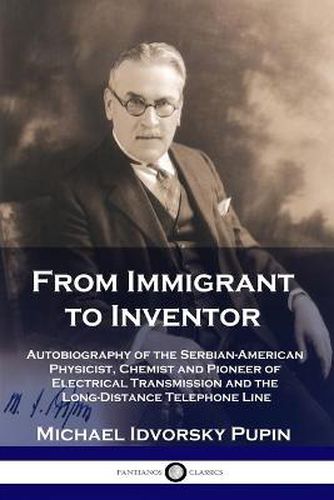Readings Newsletter
Become a Readings Member to make your shopping experience even easier.
Sign in or sign up for free!
You’re not far away from qualifying for FREE standard shipping within Australia
You’ve qualified for FREE standard shipping within Australia
The cart is loading…






This title is printed to order. This book may have been self-published. If so, we cannot guarantee the quality of the content. In the main most books will have gone through the editing process however some may not. We therefore suggest that you be aware of this before ordering this book. If in doubt check either the author or publisher’s details as we are unable to accept any returns unless they are faulty. Please contact us if you have any questions.
Michael Idvorsky Pupin was a scientist and inventor whose important contributions include the long-distance telephone line, and advances in X-ray radiation.
Pupin’s route to renown was unconventional; born in the small village of Idvor in Serbia, he managed to emigrate to the United States at a young age. Nearly penniless upon arrival at Castle Garden in New York City, he spent five years working in a series of laboring and factory jobs, while learning languages in his spare time. The hardships he endured in this period - in which he dubs himself a ‘greenhorn’ - are detailed. Eventually he managed to pass the entrance tests for Columbia College, and tutors soon recognized his keen scientific aptitude and potential.
This autobiography pays tribute to the Serbian culture, toward which Pupin strived to retain an affinity - despite becoming accustomed to the sophistication of America, his rural roots are fondly remembered. Indeed, the author is conscious of being a member of a cultured, urban intelligentsia, in sharp contrast to the humble country upbringing he had in his home country.
Pupin’s passion for science and innovation is evident as he describes travelling to further his studies in the Universities of Cambridge and Berlin. Keeping informed of advances in physics and chemistry, the newest advances in which served as groundwork for his own practical innovations.
$9.00 standard shipping within Australia
FREE standard shipping within Australia for orders over $100.00
Express & International shipping calculated at checkout
This title is printed to order. This book may have been self-published. If so, we cannot guarantee the quality of the content. In the main most books will have gone through the editing process however some may not. We therefore suggest that you be aware of this before ordering this book. If in doubt check either the author or publisher’s details as we are unable to accept any returns unless they are faulty. Please contact us if you have any questions.
Michael Idvorsky Pupin was a scientist and inventor whose important contributions include the long-distance telephone line, and advances in X-ray radiation.
Pupin’s route to renown was unconventional; born in the small village of Idvor in Serbia, he managed to emigrate to the United States at a young age. Nearly penniless upon arrival at Castle Garden in New York City, he spent five years working in a series of laboring and factory jobs, while learning languages in his spare time. The hardships he endured in this period - in which he dubs himself a ‘greenhorn’ - are detailed. Eventually he managed to pass the entrance tests for Columbia College, and tutors soon recognized his keen scientific aptitude and potential.
This autobiography pays tribute to the Serbian culture, toward which Pupin strived to retain an affinity - despite becoming accustomed to the sophistication of America, his rural roots are fondly remembered. Indeed, the author is conscious of being a member of a cultured, urban intelligentsia, in sharp contrast to the humble country upbringing he had in his home country.
Pupin’s passion for science and innovation is evident as he describes travelling to further his studies in the Universities of Cambridge and Berlin. Keeping informed of advances in physics and chemistry, the newest advances in which served as groundwork for his own practical innovations.